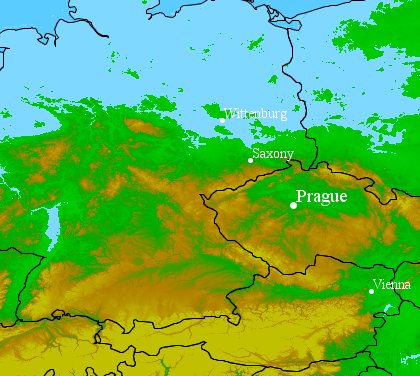The Island Principalities
The Island Principalities cover the same area as modern day southern Germany and Austria. Where northern Germany is today, in Albion there is just sea.
The islands themselves are almost entirely self-sufficient, as travel between islands is frequently made difficult by the Princes' wars. These are waged on the water-ways between the islands, and mean that any particular island-town may belong to several different Princes within the space of a year.
Relations with Albion
Relations with Albion are decidedly mixed. The Catholic principalities look to Albion as a bitter foe, to be defeated (if only they had the resources) or at least mocked repeatedly. The more Protestant ones look to Matthew for protection, which he considers something of a nuisance. However, the popular approval of Protestants on the Continent is important to England, and failing to protect even a small state from the excesses of its Catholic neighbours might well turn the tide of public opinion.
Embassies from these principalities are generally very small, to the extent that some enterprising students at Oxford have taken to putting Ambassadors up in their rooms.
Some of the Principalities
Saxony
Saxony is proud to have one of the larger Embassies in England of the principalities, occupying three rooms in Cain's College. It has been particularly successful in the island-wars, and many attribute this to its acquisition of a sea-serpent.
The Grand Nation of Austria
Consists of three dinghies and a pop-gun.
Its reversal of fortunes is largely attributed to the demise of the Hapsburgs (its ruling family, and the Holy Roman Emperors) in 1623 which is attributed to an ambitious canal-maker, a particularly unstable batch of Alchemist’s Fire and an unexpected Franzberg.
Prague
A powerful city-state run by a council of Rabbis, Prague is populated mostly by Jewish families who have settled there following persecution from various other European nations. The folk-tale of the Twenty Rabbis of Prague, who stopped an invasion from Saxony using the power of Theurgy during the 1500s, is well-known even in Albion, and often used as a cautionary tale against angering those hailing from this state.
Prague has had close ties with Albion since the Civil Wars, during which funding, supplies, food and Magical assistance to the Royalist cause was given freely and without obligation. It is widely supposed that this assistance led to the change in the Recusancy Laws, and several of Elizabeth II's closest advisors were rumoured to have ties to Prague.
The state has a large embassy in Oxford, and students of Theurgy and even Sorcery from the Invisible and even Oxford Colleges often take a year to study in Prague before completing their degrees. So far, the state has held itself largely apolitical, taking little interest in matters of European politics; except to favour those nations which welcome Jews and allow them to worship freely, and frown upon those who do not.
The Brotherhood of Yehudim hold the closest political links with Prague.
And Also (Being A Partial List)
Lippe-Detmold, Schaumburg-Lippe, Schwarzburg-Sondershausen, Schwarzburg-Rudolstadt, Reuss Elder Line (comprising the Principality of Reuss-Greiz), Reuss Younger Line (comprising the Principalities of Reuss-Schleiz, Reuss-Ebersdorf, Reuss-Lobenstein), Waldeck-Pyrmont, Hohenzollern-Hechingen, Hohenzollern-Sigmaringen and Liechtenstein1).
The Wittenberg Incident
Wittenberg was once the home of the Zaubererakademie or “Academy of Sorcery”, one of the most renowned institutions for research into natural philosophy in the world. Alchemists, Sorcerers, mathematicians and astronomers would travel from across Europe to take advantage of the unparalleled library and fascinating debates.
In the late 1400s, something went wrong. Horribly wrong.
It is not precisely known which Sorcerer, or even Sorcerers, attempted the ritual; nor precisely what they were trying to achieve. What all records agree on is that once the screams had stopped and townsfolk dared to venture out, the Zaubererakademie, along with all its students, grounds, and most of the western side of Wittenberg, had simply… disappeared. Alumni of the college, even those travelling in distant lands, vanished instantly, never to be seen again. The bare, scorched earth where the Academy had once been howled with unearthly winds, and the area was said to be haunted.
The incident has been fictionalised in several popular plays, most notably in recent years Marlowe's Doctor Faustus, or the Delightful Narrative of the Sorcerer of Wittenberg. To the Church's displeasure, very few of these are morality tales concerning the dangers of forbidden knowledge; the vast majority are comedies, representing the Zaubererakademie as the haunt of bumbling incompetents and rakish sybarites, and the Infernal hordes as dapper, well-dressed gentlemen with surprising resemblances to local politicians and the clergy.
The fortunes of Wittenberg and the surrounding lands never really recovered from the disaster, and in the present day the town is almost deserted, and surrounded by a wall of water, which stops, steaming, as it reaches the grey land.
Rumours
One of the Habsburg line still lives! She was washed up alive, and taken in by peasants.
Where there are sea-serpents you can bet there'll be Horties. It's not right, them meddlin' like that.
Just think, if you could harness the power at Wittenberg…

